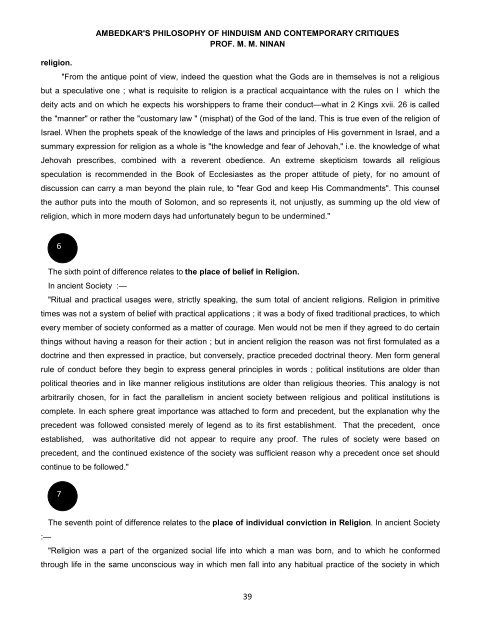Ambedkar-Philosophy of Hinduism
Create successful ePaper yourself
Turn your PDF publications into a flip-book with our unique Google optimized e-Paper software.
eligion.<br />
AMBEDKAR'S PHILOSOPHY OF HINDUISM AND CONTEMPORARY CRITIQUES<br />
PROF. M. M. NINAN<br />
"From the antique point <strong>of</strong> view, indeed the question what the Gods are in themselves is not a religious<br />
but a speculative one ; what is requisite to religion is a practical acquaintance with the rules on I which the<br />
deity acts and on which he expects his worshippers to frame their conduct—what in 2 Kings xvii. 26 is called<br />
the "manner" or rather the "customary law " (misphat) <strong>of</strong> the God <strong>of</strong> the land. This is true even <strong>of</strong> the religion <strong>of</strong><br />
Israel. When the prophets speak <strong>of</strong> the knowledge <strong>of</strong> the laws and principles <strong>of</strong> His government in Israel, and a<br />
summary expression for religion as a whole is "the knowledge and fear <strong>of</strong> Jehovah," i.e. the knowledge <strong>of</strong> what<br />
Jehovah prescribes, combined with a reverent obedience. An extreme skepticism towards all religious<br />
speculation is recommended in the Book <strong>of</strong> Ecclesiastes as the proper attitude <strong>of</strong> piety, for no amount <strong>of</strong><br />
discussion can carry a man beyond the plain rule, to "fear God and keep His Commandments". This counsel<br />
the author puts into the mouth <strong>of</strong> Solomon, and so represents it, not unjustly, as summing up the old view <strong>of</strong><br />
religion, which in more modern days had unfortunately begun to be undermined."<br />
6<br />
The sixth point <strong>of</strong> difference relates to the place <strong>of</strong> belief in Religion.<br />
In ancient Society :—<br />
"Ritual and practical usages were, strictly speaking, the sum total <strong>of</strong> ancient religions. Religion in primitive<br />
times was not a system <strong>of</strong> belief with practical applications ; it was a body <strong>of</strong> fixed traditional practices, to which<br />
every member <strong>of</strong> society conformed as a matter <strong>of</strong> courage. Men would not be men if they agreed to do certain<br />
things without having a reason for their action ; but in ancient religion the reason was not first formulated as a<br />
doctrine and then expressed in practice, but conversely, practice preceded doctrinal theory. Men form general<br />
rule <strong>of</strong> conduct before they begin to express general principles in words ; political institutions are older than<br />
political theories and in like manner religious institutions are older than religious theories. This analogy is not<br />
arbitrarily chosen, for in fact the parallelism in ancient society between religious and political institutions is<br />
complete. In each sphere great importance was attached to form and precedent, but the explanation why the<br />
precedent was followed consisted merely <strong>of</strong> legend as to its first establishment. That the precedent, once<br />
established, was authoritative did not appear to require any pro<strong>of</strong>. The rules <strong>of</strong> society were based on<br />
precedent, and the continued existence <strong>of</strong> the society was sufficient reason why a precedent once set should<br />
continue to be followed."<br />
7<br />
The seventh point <strong>of</strong> difference relates to the place <strong>of</strong> individual conviction in Religion. In ancient Society<br />
:—<br />
"Religion was a part <strong>of</strong> the organized social life into which a man was born, and to which he conformed<br />
through life in the same unconscious way in which men fall into any habitual practice <strong>of</strong> the society in which<br />
39


















